

History. Les conflits ethniques en Birmanie. Alors que la Birmanie semblait sur la voie de l’apaisement et d’un processus démocratique, les conflits ethniques ressurgissent.

Ces dernières semaines ont été marquées par un renouveau des massacres de musulmans à l’ouest du pays, qui ont repris depuis 2012. Mais la Birmanie connaît des conflits ethniques depuis sa création et qui s’amplifient malgré la rhétorique démocratique du gouvernement. Sites/reliefweb.int/files/resources/Conflits armes lumiere sur la RDC.pdf. Sites/reliefweb.int/files/resources/Conflits armes lumiere sur la RDC.pdf.
Rébellion et religion au Yémen. La base sociale des soutiens des houthistes est variée : l’ancienne aristocratie hachémite se revendiquant de la descendance du prophète Mohammed et qui avait, sous le règne de l’imamat zaydite, le monopole du leadership politique et religieux, mais surtout nombre de tribus de la région de Saada, liées en particulier à la confédération tribale Bakil.
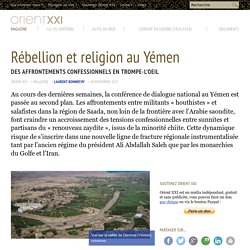
Afin de légitimer son effort de guerre, l’État s’est lui-même engagé dans une stigmatisation du zaydisme et de ses expressions. La répression, les bombardements indiscriminés lors des différents cycles de la guerre ont fait plusieurs dizaines de milliers de victimes, entraîné des destructions importantes et généré une nouvelle dynamique identitaire. MEMRITV - The Middle East Media Research Institute. Gang Members from Los Angeles Join the Fray in Syria, Fighting alongside the Regime.
Les vrais chiffres du terrorisme en Europe, bien loin des perceptions. ANALYSE Il existe une différence entre le nombre d'attentats islamistes commis en Europe et la perception qu'en a l'opinion publique...

Negative Attitudes toward the United States in the Muslim World: Do They Matter? Negative Attitudes toward the United States in the Muslim World: Do They Matter?
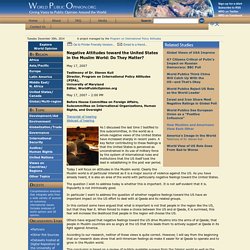
May 17, 2007 Testimony of Dr. Most Victims of Islamic Terrorism are Muslims... And Why America is to Blame For It. (Updated – see below) Following the 9/11 attacks, President George Bush signed into law the Patriot Act and the Intelligence Reform and Terrorism Prevention Act (IRTPA), both of which gave “the government sweeping authority to spy on individuals inside the United States.”

IRTPA also established the National Counterterrorism Center (NCTC), which began publishing annual terrorism reports since 2005. Pourquoi les talibans ont attaqué l'école de Peshawar. Greater Middle East: the US plan. THE Bush administration justified the invasion of Iraq on three pretexts.
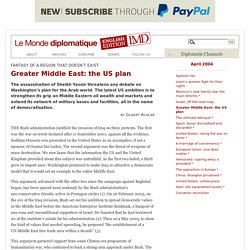
The first was the war on terror declared after 11 September 2001; against all the evidence, Saddam Hussein was presented in the United States as an accomplice, if not a sponsor, of Osama bin Laden. The second argument was the threat of weapons of mass destruction.
Rich / Poor Conflicts. When do inequalities cause conflict? History has shown that large inequalities in wealth and income persist and do not always lead to rebellion and conflict.
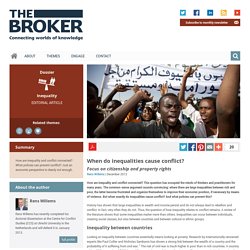
In fact, very often they do not. Thus, the question of how inequality relates to conflict remains. A review of the literature shows that some inequalities matter more than others. Inequalities can occur between individuals, creating social classes, but also between countries and between cultural or ethnic groups. Social Dominance Orientation and the Legitimization of Inequality Across Cultures. In Germany, Anti-American Sentiment Fuels Push to Tread Softly on Ukraine.
Egypt–United States relations. Egypt–United States relations refers to the current and historical relationship between Egypt and the United States.
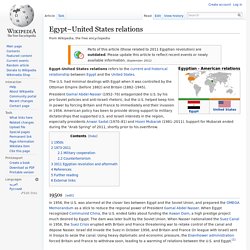
The U.S. had minimal dealings with Egypt when it was controlled by the Ottoman Empire (before 1882) and Britain (1882–1945). President Gamal Abdel-Nasser (1952–70) antagonized the U.S. by his pro-Soviet policies and anti-Israeli rhetoric, but the U.S. helped keep him in power by forcing Britain and France to immediately end their invasion in 1956. Social Dominance Orientation, Authoritarianism, and Support for Intergroup Violence Between the Middle East and America - Henry - 2005 - Political Psychology.
Racism. Huntington. Pew Global. Www.hsrgroup.org/docs/Publications/HSR2005/2005HumanSecurityReport-Part5-DramaticDeclineArmedConflict.pdf. Page. Causes and Solutions for Peace. Doctrine Bush. Un article de Wikipédia, l'encyclopédie libre.
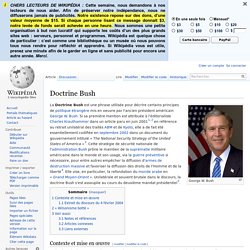
La Doctrine Bush est une phrase utilisée pour décrire certains principes de politique étrangère mis en oeuvre par l'ancien président américain George W. Islamic State: What has Kobane battle taught us? 2005HumanSecurityReport-Part5-DramaticDeclineArmedConflict.pdf. Civilization Grafting: No Culture is an Island. The end of the Cold War has indeed brought about a new phase in world politics, yet its impact is not unidirectional.
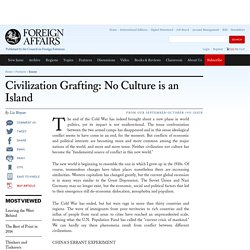
The tense confrontation between the two armed camps has disappeared and in this sense ideological conflict seems to have come to an end, for the moment. But conflicts of economic and political interests are becoming more and more common among the major nations of the world, and more and more tense. Le Mans. Un homme interné après avoir crié "Allah Akbar" France: Muslim destroys Christmas decorations, screams “Allahu akbar” Germany Looks to Russia and China. Russia’s annexation of Crimea in March 2014 was a strategic shock for Germany. Suddenly, Russian aggression threatened the European security order that Germany had taken for granted since the end of the Cold War.
Berlin had spent two decades trying to strengthen political and economic ties with Moscow, but Russia’s actions in Ukraine suggested that the Kremlin was no longer interested in a partnership with Europe. Despite Germany’s dependence on Russian gas and Russia’s importance to German exporters, German Chancellor Angela Merkel ultimately agreed to impose sanctions on Russia and helped persuade other EU member states to do likewise. Islam's women fight for their rights. SHIRIN Ebadi’s Nobel peace prize, the first for a Muslim woman, brought the demands of Iranian women for equal rights and freedoms to the attention of the world and seemed to signal an important advance.
A Criticism of Huntington's "Clash of Civilizations" The Clash of Civilizations and the Remaking of World OrderJuly 20, 2010Author : Huntington, Samuel P. Title : The Clash of Civilizations and the Remaking of World Order. Europe's New Far Right. Aim: To understand the re-emergence of far right groups across Europe in response to a perceived threat from Islam. The July attacks carried out in Norway by Anders Breivik, who killed 77 people, were the first of their kind in Europe.
« Plus de 80 % des victimes du djihadisme sont des musulmans » A Criticism of Huntington's "Clash of Civilizations"